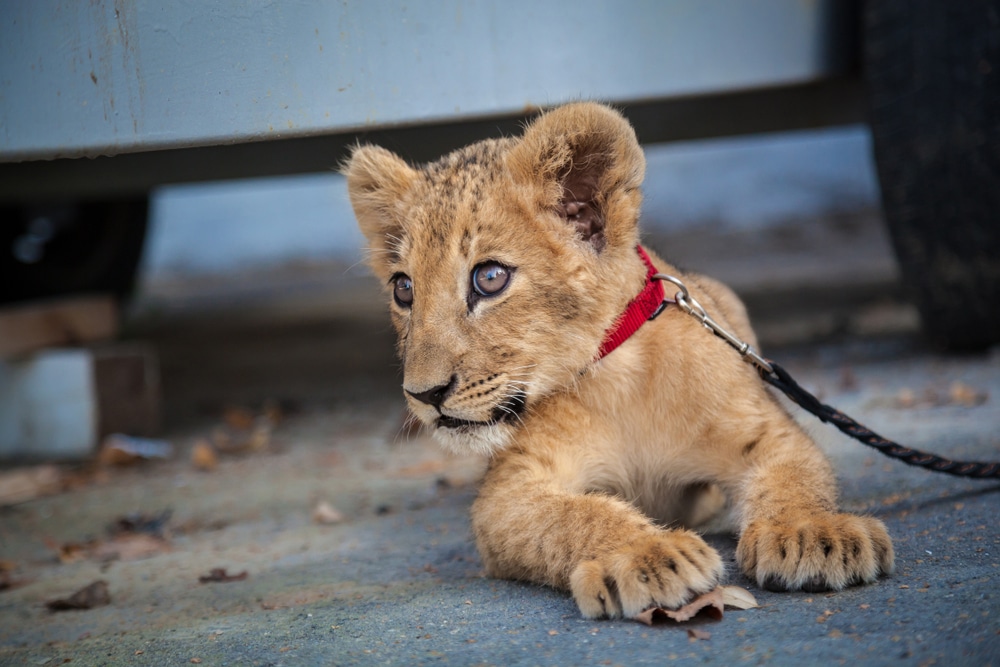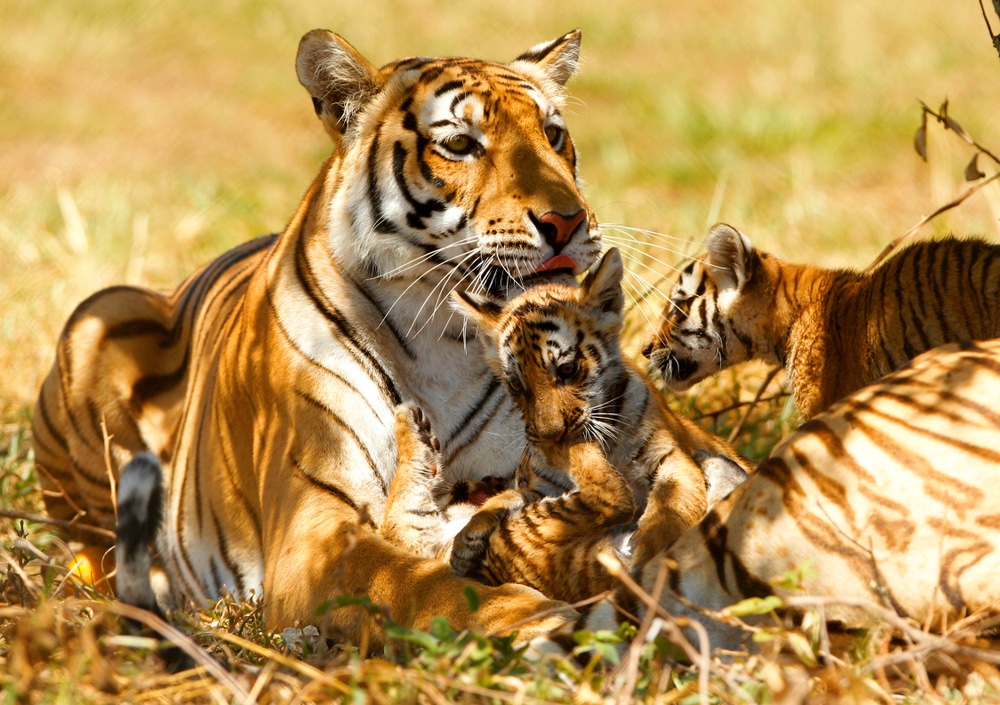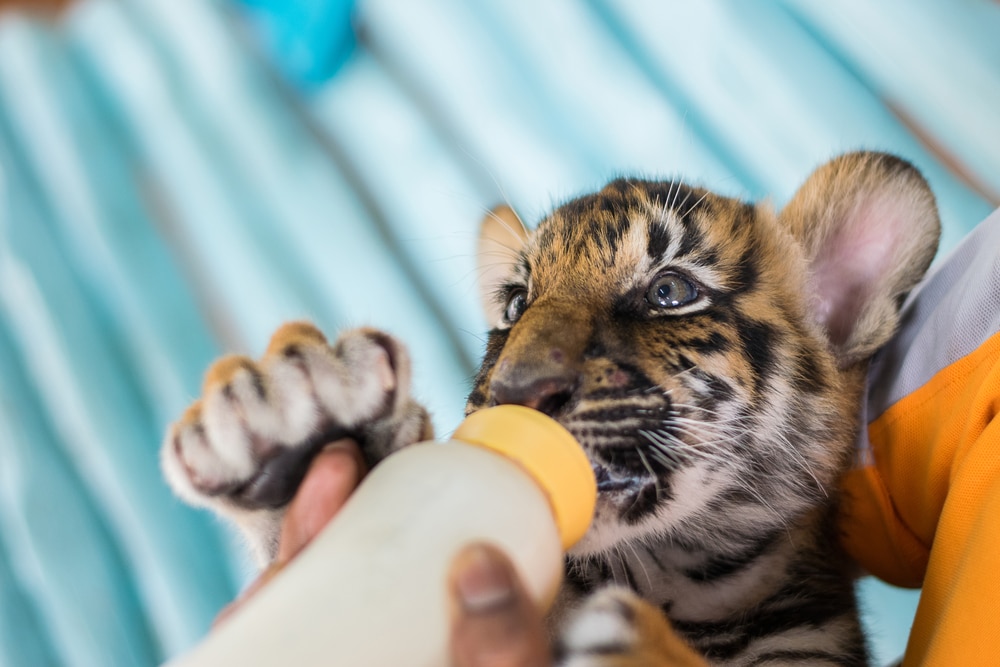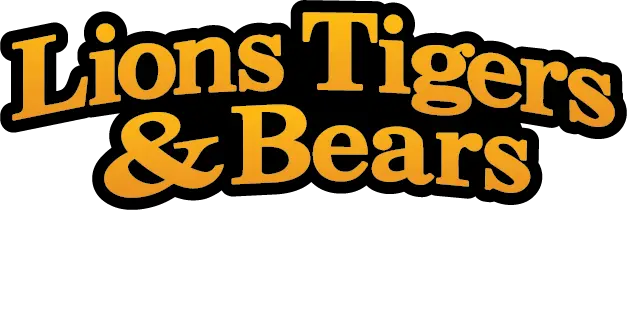
Cubs are cute, and that’s perhaps their biggest vulnerability. Their inherent cuteness and majestic presence make them incredibly appealing – and many people will happily pay to play with these animals. Sadly, the practice of cub petting attractions not only harms the animals in question but also helps fuel the illegal wildlife trade.
As a big cat lover, you might not know this yet, but cub petting is actually cub abuse. Many roadside zoos and aquariums use animals to their own advantage. They claim they breed to help save the species, but in reality, they only create a surplus of animals who can’t survive in the wild, all for profit.
This article will help you understand why cub petting is harmful and unethical and why it's important to advocate for their well-being by letting them remain in their natural habitat.

Cub petting is where you pay money to interact with wild animals, usually at roadside zoos and other tourist attractions. So, basically, you can touch, hold, feed, or even take photos with the cubs at a fee. Petting a cub is desirable to many people all over the world, because it allows you to connect with nature and witness the beauty of these majestic animals up close. In fact, it can be like a dream come true for a lot of unsuspecting animal lovers.
But there’s more to cub petting than meets the eye. These animal exploiters prey on your affection toward the cubs and exploit your desire to hold and care for the animals. They do this to mask the dark side of their business, which depends on different forms of animal cruelty for existence.
The sad truth is that these businesses exploit and over breed exotic animals for profit. They take advantage of the fact that people love to see these animals and marvel at their cuteness. However, they do not show where the animals come from or what happens when they grow up. If people knew that petting a cub, liking and sharing videos on social media, or following baby animal posts was actually harming them, would they still be so popular?
If you consider yourself to be a cat lover, you should know that petting a cub:
The cycle of harm begins with the female cats—often lions or tigers—who are repeatedly bred to produce cubs for these attractions. These majestic mothers are repeatedly bred at a relentless pace, far beyond what is natural or healthy.
In their natural habitats, mother tigers and lions nurture and protect their young, teaching them essential survival skills. The natural bonding process is crucial for the cubs' development and the mother's emotional well-being. However, in cub petting operations, this bond is abruptly and repeatedly severed, denying both mother and cubs the natural, nurturing relationship with their cubs that they require.

The cubs themselves are the most visible victims. They’re separated from their mothers shortly after birth and miss out on essential nurturing and learning. This early separation can result in long-term psychological and physical health issues.
The cubs are also exposed to excessive handling by humans, which can lead to stress, illness, and improper social development. They are often declawed, a brutal procedure that involves the amputation of the last bone in each toe, leading to severe pain, infection, and long-term physical and psychological issues. Additionally, they are defanged to make them “safer” for customers. Once they grow too large for petting—which happens within 8 to 12 weeks—they often face uncertain futures, including being sold off, kept in inadequate conditions, or even euthanized.
Many pay-to-play operations market cub petting under the guise of conservation, claiming that the money raised supports wildlife protection efforts. However, this is completely misleading. Actual conservation involves protecting animals in their natural habitats and using funds to ensure their survival and well-being in the wild.
The money from cub petting often supports the continued operation of these exploitative businesses rather than genuine conservation. Moreover, these interactions can also pose direct risks to the public, as even young animals are capable of causing injuries, and close contact raises the risk of disease transmission.

Cub petting helps fuel a growing public interest in exotic animals as pets. When people interact with these adorable cubs and share their experiences on social media, it inadvertently promotes a desire to own similar animals privately. The rise in demand encourages unscrupulous breeders and traffickers to supply cubs for petting operations and the private pet trade. They may source cubs from countries with less stringent wildlife protection laws or just poach them. Black market demand is a leading cause of the illegal wildlife trade, which is one of the largest illicit businesses in the world, ranking up there with illegal drugs and the trafficking of weapons and firearms.
Cub petting contributes to a broader misunderstanding of wildlife conservation and animal welfare. It encourages the breeding of animals in captivity under the pretext of educational value and conservation while doing little to ensure the survival of these species in the wild. Furthermore, it diverts attention and resources from genuine conservation efforts involving habitat preservation, anti-poaching measures, and scientific research.
The United States government has made significant strides in combating issues surrounding cub petting and the broader exploitation of big cats. A pivotal piece of legislation in this effort is the Big Cat Public Safety Act of 2022. This act, which received strong advocacy from figures like Bobbi Brink, the founder of Lions Tigers & Bears, aims to prohibit the private possession of big cats as pets.
Many organizations, including LTB, are also keen on educating the public about the dangers of cub petting and the importance of preserving these magnificent animals in their natural habitats.
If you're passionate about animal welfare and want to make a positive impact, choosing to support and visit reputable animal sanctuaries like Lions Tigers & Bears is a great start. These sanctuaries adhere to strict ethical guidelines, including no petting, no breeding, and no kill policies, ensuring that the animals are treated with the respect and care they deserve. When you support such organizations, you provide a safe and natural environment for rescued animals and help contribute to the broader goal of wildlife rescue and conservation.
It’s also a good idea to educate yourself and others about the realities of wildlife exploitation. Learn about the harmful effects of practices like cub petting and share this knowledge to discourage participation in such activities. You can also advocate for stronger wildlife protection laws and be a responsible tourist. When traveling, choose experiences that allow you to observe wildlife without disturbing their natural behaviors.
Lastly, use your social media influence to spread awareness about ethical wildlife interactions. Promote the work of sanctuaries, like LTB that prioritize animal welfare and explain the importance of rescue and conservation efforts. Your voice can inspire others to make more informed choices, reducing demand for exploitative animal attractions and fostering a culture that respects and protects our natural world.

Ph: 619.659.8078
Fx: 619.659.8841
[email protected]
24402 Martin Way, Alpine, CA 91901